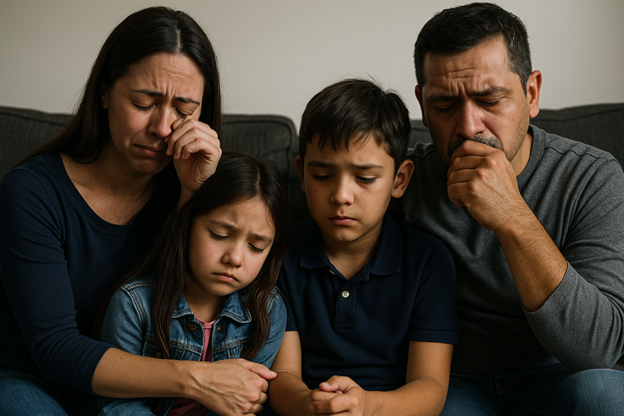
BIA Denies Cancellation of Removal for Ecuadorian Father: Matter of Buri Mora (2025)
Authority: Board of Immigration Appeals (BIA), designated as precedent
Key takeaway: Economic strain, family separation, and children’s medical/educational needs—while real and difficult—did not rise to the legal standard of “exceptional and extremely unusual hardship” required for cancellation of removal.
The Story
Diego Geovanny Buri Mora, a father of three U.S. citizen children and husband to a U.S. citizen wife, faced deportation to Ecuador. He asked for cancellation of removal for nonpermanent residents, a form of relief that lets certain long-term immigrants remain in the U.S. if deportation would cause extraordinary hardship to their U.S. citizen or lawful permanent resident relatives.
Here’s what he argued:
- His daughter has autism and anxiety, and his two sons have developmental delays.
- He was the main financial provider, and his deportation would cause severe economic strain.
- His family would suffer serious emotional hardship from separation.
The Immigration Judge originally sided with him, finding that the combination of these hardships met the high standard. DHS (the government) appealed.
The Legal Standard
To win cancellation of removal, an applicant must prove:
- Continuous presence in the U.S. for at least 10 years,
- Good moral character,
- No disqualifying crimes, and
- That removal would cause “exceptional and extremely unusual hardship” to certain family members.
This last requirement is the toughest. Hardship must go far beyond the usual pain, financial loss, and separation that almost every deported family experiences.
The BIA’s Reasoning
The Board overturned the Immigration Judge’s decision. Here’s why:
-
Medical and educational needs were being managed.
- The children’s conditions were real but were already supported by state Medicaid, early intervention programs, and individualized education plans in New Jersey.
- Since the children would remain in the U.S. with their mother, they would not lose access to these services if the father was deported.
-
Financial hardship was not exceptional.
- His wife had stable full-time work as a surgical coordinator.
- She also had extended family support and government assistance.
- While money would be tighter, the Board stressed that economic loss is a normal result of deportation and rarely meets the standard.
-
Emotional hardship, though genuine, is common.
- The daughter had shown distress from her father’s detention.
- But emotional suffering and separation are also typical in deportation cases and do not usually qualify as “exceptional and extremely unusual.”
-
Family support in the U.S. mattered.
- The wife’s extended family lived nearby and had helped with childcare before.
- This support reduced the risk that the family would face overwhelming hardship without the father.
Outcome
- DHS’s appeal was sustained.
- The Immigration Judge’s grant of cancellation was vacated.
- Mr. Buri Mora was ordered removed to Ecuador.
The Board did not even reach the other issues (good moral character and discretion) because the hardship claim failed—without it, cancellation is impossible.
Why This Case Matters
- For immigrant families: The hardship standard is extremely tough. Even children with disabilities or special needs may not be enough if those needs can still be met in the U.S. after deportation.
- For attorneys: Evidence must show truly extraordinary circumstances—such as life-threatening medical issues without treatment in the U.S., or situations where children would have to relocate abroad and lose essential care.
- For policymakers: The case illustrates how rigid the “exceptional and extremely unusual hardship” rule is, and why many families with U.S. citizen children are still deported.
Bottom Line
In Matter of Buri Mora (2025), the BIA ruled that although Mr. Buri Mora’s family would suffer emotionally, financially, and medically from his deportation, the hardships were not beyond what many families face. His application for cancellation of removal was denied, and he was ordered deported to Ecuador.
This decision reinforces how narrow and demanding the hardship standard is under U.S. immigration law.
Let’s Get Started
Your legal challenges deserve personalized attention and innovative solutions. Contact Oware Justice Advocates PC today for a consultation and take the first step toward resolution and peace of mind.
355 South Teller Street, Suite 204,
Lakewood, CO 80226
(Visits to the office are strictly by appointment only)
303-514-6589

